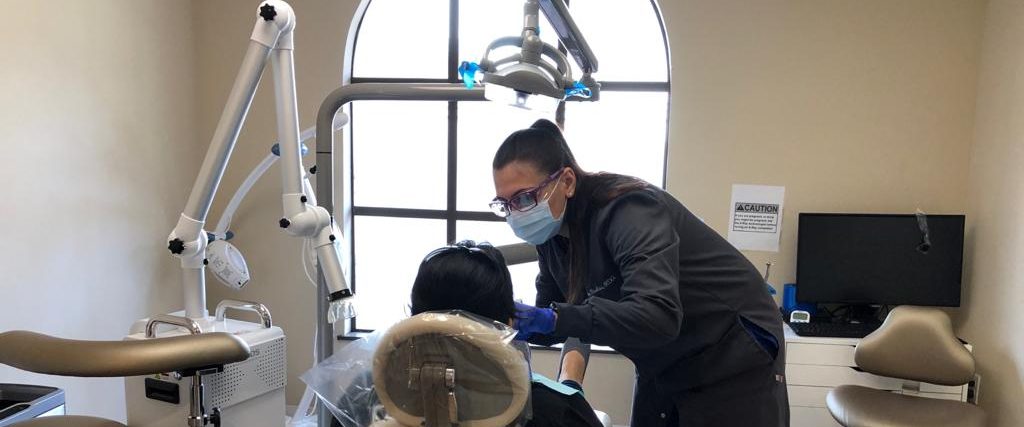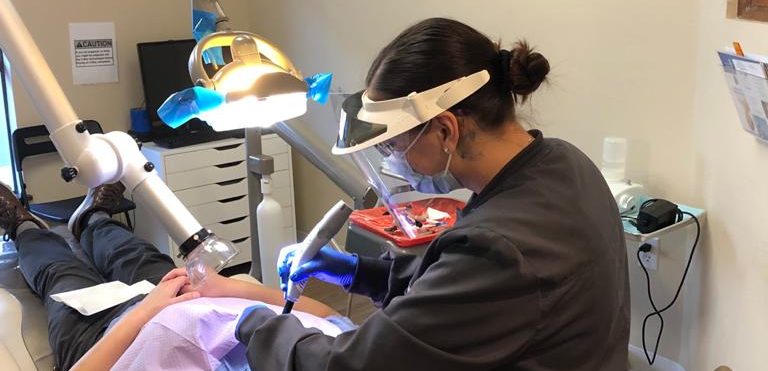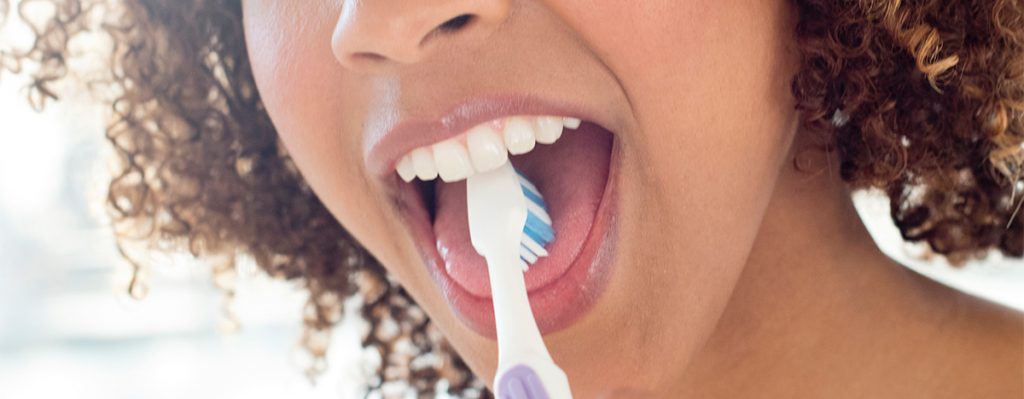Date : 25/08/2020
Your enamel is the outer protective layer of your teeth. It protects the teeth against chemical and physical damage. In fact, tooth enamel is the hardest tissue in the human body. Knowing that, you might think it can withstand anything, creating a barrier between your tooth and the rest of the world. Certainly, enamel erosion shouldn’t be an issue.
Unfortunately, that’s not the case.
Enamel isn’t indestructible. Bad oral hygiene and the foods you eat can wear it away. But, you’re not powerless in this situation.
You have some control of you enamel erosion, and we’re going to tell you exactly how to preserve this important substance.
What You Need to Know About Enamel Erosion
Tooth enamel is the hard, semi-clear outer layer of the teeth that protects teeth from daily wear and tear, and it keeps you from feeling temperature extremes from the hot and cold things you drink and eat.
Enamel is made up of mostly minerals, particularly hydroxyapatite, and is semi-translucent. It’s partially responsible for the color of your teeth.
The thing that you need to know is:
The substance that makes up enamel isn’t alive. That means it cannot regenerate. So, it’s vitally important to protect your enamel against erosion because what you’ve got is all you’re going to get.
Now about the downfall
Enamel is great and helpful, but as we said, it’s not indestructible.
Your enamel tries its best to fend off chemicals and acids that can damage your teeth, but unless you lend a hand, it’s a losing battle.
Enamel erosion is simply the loss of enamel caused by an acid attack.
Each time you drink or eat anything acidic, your enamel becomes soft for a while and loses some of its mineral content. But saliva comes in and plays a vital role in slowly canceling out the acidity in your mouth. That gets the enamel back to its natural balance.
Here’s the thing:
If the acid attacks occur often, the enamel cannot repair itself, and tiny bits of it are brushed away, which ends in enamel erosion.
Over time, you lose the surface of your teeth. And once the shell erodes, your teeth are likely to develop cavities and decay.
There are signs to looks for that will tell you enamel erosion is well underway.
Symptoms and Causes
There’s nothing worse than sipping your favorite cup o’ joe in the morning and feeling searing pain shoot through your mouth. But that’s a sign something is wrong with your enamel.
But that’s not the only sign. Here are some things you need to look for:
Enamel erosion symptoms
Erosion typically shows up as hollows in the teeth and a general wearing away of the surface and biting edges. That wear exposes the dentin underneath, which is darker and yellow compared to the enamel.
If your teeth start losing the enamel, you’ll notice:
- Cracks and chips
- Discoloration
- Indentations, known as cups on the teeth’s surface
- Increased sensitivity to textures, temperature, and taste
However, symptoms vary from one person to another. Some of the signs for you may be subtle whereas, for someone else, they may be glaring. No matter how small, though, the signs are the same.
Over time, the enamel erosion can even lead to complications. Here’s what to look for:
- Fractured teeth
- Yellow and stained teeth
- Shiny spots on your teeth
- Overly sensitive teeth
- Rough edges on your teeth
- Increased tooth decay
- Clear or slightly translucent teeth
- Smooth and shiny surfaces on the teeth
Enamel erosion: the culprits
Enamel erosion can occur for a number of reasons, and although you have control over some of them, some are beyond your control.
The erosion itself occurs when acids wear away the enamel. And that can be caused by:
- Acid reflux disease (GERD)
- Diet with high in starches and sugar
- Low salivary flow or dry mouth (xerostomia)
- Gastrointestinal problems
- Alcoholism, bulimia, or binge drinking.
- Medications, such as aspirin and antihistamines
- Excessive consumption of soft drinks
- Genetics
- Environmental factors, like wear and tear, friction, stress, and corrosion
- Grinding your teeth (bruxism)
- Acidic drugs or supplements
- Fruit drinks (Some fruit acids in fruit drinks are even more erosive than battery acid.)
Got that?
Let’s dig a little deeper:
Attrition is the natural tooth-to-tooth friction that occurs when you clench or grind your teeth, which typically occurs involuntarily when you’re asleep.
Abfraction comes from stress fractures in the tooth, such as cracks that come from flexing or bending of the teeth.
And corrosion occurs chemically when acidic content hits the tooth surface, like from Vitamin C tablets, aspirin, highly acidic foods, alcoholism, bulimia, frequent vomiting, and GERD.
Not only that:
If you brush your teeth too hard, bite on hard objects like pens, fingernails, and bottle caps, abrasion typically occurs. It can also be caused by improper flossing and chewing tobacco.
You Don’t Have to Be a Victim of Enamel Erosion
Since your enamel cannot be replaced, your best bet to protect your teeth against enamel erosion is prevention.
We recommend the following:
Be cautious of your citrus intake
Even though citrus fruits are high in fiber and vitamins, they’re acidic. That means that when you consume a lot of oranges, lemon-flavored beverages and grapefruits, it’s taking a toll on your teeth.
We aren’t saying you should give up citrus fruits, but you should keep an eye on how many you consume. And when you do eat them, drink water after eating them to rinse away abrasive juices.
Skip the soda
While soda might be sweet and refreshing, it’s bad for your teeth enamel and the rest of your body. That’s especially true in large amounts.
The truth is:
Most sodas contain a lot of sugar which leads to the production of decay-causing bacteria. Even some unsweetened fizzy drinks may be too acidic for your enamel.
We recommend that you kick the soda habit. Choose something better for your body and your teeth.
Brush your teeth right
You probably already know you need to brush your teeth twice a day to reduce the risk of developing cavities.
But did you also know you can brush them wrong?
The right way to brush is to do it gently because brushing vigorously leads to enamel erosion. And if you’re concerned about enamel loss, use an extra soft toothbrush.
Your teeth will still get clean, and your enamel will stay intact.
The friendly staff at Your Caring Dentist Group can help by teaching you the correct way to brush.
Drink in moderation
You’ve heard this one before: Drink in moderation.
And while you probably received this advice for overall body health and longevity, it’s also great advice for preventing enamel erosion.
Some alcoholic drinks contain too much sugar, while other drinks are too acidic. On top of that, alcoholic beverages are dehydrating, which means they can dry out your mouth and minimize the production of saliva.
And, as we’ve learned, saliva protects your enamel.
So, try this:
If you’re going to drink, dilute your drink by sipping water in between the alcohol.
Grab a pack: maybe
No, we’re not talking about cigarettes. We’re talking about chewing gum!
The act of chewing gum stimulates the production of that beneficial saliva. But forget the Hubba Bubba, and go for the sugar-free.
Cows are your friends
Dairy products help protect your teeth.
According to the University of Rochester Medical Center, eating cheese helps to produce more saliva, which rinses debris and acidic residue after meals.
Cheese is also high in calcium and phosphate, which are essential in remineralizing the enamel that has become weak.
Treat certain conditions
As listed above, some medical conditions can erode your enamel.
For example, when acid washes up into your mouth due to GERD, it can erode your teeth. Also, bruxism wears away your enamel.
See your doctor about treating these conditions and other biological habits that adversely affect your teeth. Taking a proactive approach can give you control back and stop enamel erosion in its tracks.
Grab a drink
We all have to eat. And some of those foods aren’t great for your enamel.
One way to fight against any food or drink that might damage your enamel is drinking water. This helps in preventing enamel loss.
We recommend that you rinse your mouth often with water to swish away harmful substances.
Book that appointment with Your Caring Dentist
The best way to protect your teeth is to work with your dentist. A dentist can detect any erosion and offer tips on how to reduce it.
If it’s been a while since you visited a dentist, pick up the phone and book that appointment. Your Caring Dentist Group can tell you where your enamel stands right now and help to preserve what remains.
Enamel Erosion Is No Match
You’re armed and ready to fight enamel erosion.
Not only do you know the signs and causes, you now know how to prevent it and save your enamel.
Your enamel can’t save itself, and it can’t reproduce. It’s up to you to do the heavy lifting and protect your teeth from enamel erosion.
And really, the lifting isn’t all that heavy.
Just be aware of what you eat and drink, and how it affects your oral health. If you do that and follow the tips we’ve laid out for you, you’re golden.
And your enamel will thank you.




